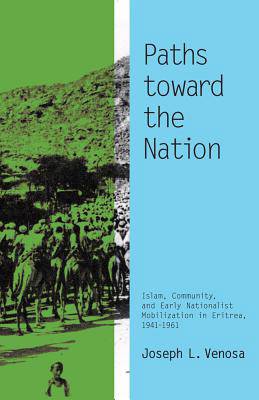
Je cadeautjes zeker op tijd in huis hebben voor de feestdagen? Kom langs in onze winkels en vind het perfecte geschenk!
- Afhalen na 1 uur in een winkel met voorraad
- Gratis thuislevering in België vanaf € 30
- Ruim aanbod met 7 miljoen producten
Je cadeautjes zeker op tijd in huis hebben voor de feestdagen? Kom langs in onze winkels en vind het perfecte geschenk!
- Afhalen na 1 uur in een winkel met voorraad
- Gratis thuislevering in België vanaf € 30
- Ruim aanbod met 7 miljoen producten
Zoeken
Paths toward the Nation
Islam, Community, and Early Nationalist Mobilization in Eritrea, 1941-1961
Joseph L Venosa
€ 55,95
+ 111 punten
Omschrijving
In the early and mid-1940s, during the period of British wartime occupation, community and religious leaders in the former Italian colony of Eritrea engaged in a course of intellectual and political debate that marked the beginnings of a genuine national consciousness across the region. During the late 1940s and 1950s, the scope of these concerns slowly expanded as the nascent nationalist movement brought together Muslim activists with the increasingly disaffected community of Eritrean Christians. The Eritrean Muslim League emerged as the first genuine proindependence organization in the country to challenge both the Ethiopian government's calls for annexation and international plans to partition Eritrea between Sudan and Ethiopia. The league and its supporters also contributed to the expansion of Eritrea's civil society, formulating the first substantial arguments about what made Eritrea an inherently separate national entity. These concepts were essential to the later transition from peaceful political protest to armed rebellion against Ethiopian occupation. Paths toward the Nation is the first study to focus exclusively on Eritrea's nationalist movement before the start of the armed struggle in 1961.
Specificaties
Betrokkenen
- Auteur(s):
- Uitgeverij:
Inhoud
- Aantal bladzijden:
- 312
- Taal:
- Engels
- Reeks:
- Reeksnummer:
- nr. 92
Eigenschappen
- Productcode (EAN):
- 9780896802896
- Verschijningsdatum:
- 15/05/2014
- Uitvoering:
- Paperback
- Formaat:
- Trade paperback (VS)
- Afmetingen:
- 137 mm x 216 mm
- Gewicht:
- 317 g

Alleen bij Standaard Boekhandel
+ 111 punten op je klantenkaart van Standaard Boekhandel
Beoordelingen
We publiceren alleen reviews die voldoen aan de voorwaarden voor reviews. Bekijk onze voorwaarden voor reviews.









